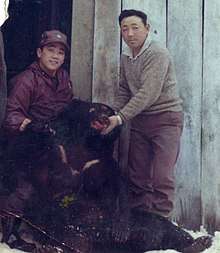Matagi
The Matagi (Japanese: 又鬼) are traditional winter hunters of the Tōhoku region of northern Japan, most famously today in the Shirakami-Sanchi forest between Akita and Aomori. They hunt deer and bear, and their culture has much in common with the bear worship of the Ainu.

The Matagi have a unique culture that centers around their belief in mountain gods and distinct law. For them, hunting is a way of life and not a form of entertainment. The animals hunted are seen as gifts from the mountain gods and the Matagi have a certain way to carve and prepare the animal. After the animal is killed, it is praised, and the spirit comforted. Then, to recompense for the loss of life, everything from the fur to the internal organs is used. Emphasis is put on the act of taking an animal's life through ceremony and reflection, which is then passed along to future generations of Matagi.
The Matagi live in small hamlets of the mountain beech forests of Tōhoku and engage in agriculture during the planting and harvest season. In the winter and early spring, they form hunting bands that spend weeks at a time in the forest. With the introduction of modern firearms in the 19th century, and the rise of domestic rifle manufacture beginning with the Murata rifle, the need for group hunting for bear has diminished, leading to a decline in Matagi culture.
Matagi hamlets are found in the districts of Nishitsugaru and Nakatsugaru (Aomori Prefecture), Kitaakita and Senboku (Akita Prefecture), Waga (Iwate Prefecture), Nishiokitama and Tsuruoka (Yamagata Prefecture), Murakami and Nakauonuma (Niigata Prefecture and Nagano Prefecture).
The Matagi are attested from the medieval period but continue to hunt today. They have come into conflict with environmentalists now that the forest has been partly cleared.[1] They no longer hunt the Japanese serow, which is protected, but continue to hunt bear. Matagi hunt by special license.
Specialised Matagi hunting vocabulary contains Ainu words.[2][3] Indeed, the word matagi itself may be Ainu, from matangi or matangitono, "man of winter, hunter".[4]
Literary references
Matagi are referenced and described in the biographical novel Dog Man: An Uncommon Life on a Faraway Mountain by Martha Sherrill, alongside descriptions of a real modern day Matagi named Uesugi, who was a friend of the main characters who helped preserve the Akita breed of dog, which they used extensively for hunting.
In the manga series Golden Kamuy a Matagi hunter named Tanigaki Genjirou is prominently featured, as well as Ainu culture in general.
References
| Wikimedia Commons has media related to Matagi. |
- "Matagi: Hunters as Intermediaries Between 'Wild' and 'Domestic.'" Scott Schnell, Japan Anthropology Workshop, March 14, 2010
- Kudō Masaki (1989). Jōsaku to emishi. Kōkogaku Library #51. New Science Press. p. 134
- Tanigawa, Ken'ichi (1980). Collected works, vol. 1. pp. 324–325
- mata 'winter', tono 'leader'